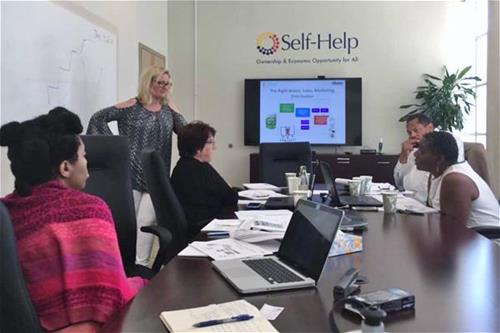
Tera Johnson (left, back), director of the Food Finance Institute, leading a recent session of Financial Management Boot Camp for entrepreneurs. Photo by Dylan Timmerman.
Self-Help Credit Union hosted a variety of food entrepreneurs for the first of two sessions of a Financial Management Boot Camp on June 6 and 7 in Durham, NC. The workshops, led by Tera Johnson from the Food Finance Institute, help entrepreneurs in the food and farm industries learn how to expand their businesses while remaining financially sustainable.
This Boot Camp builds on Self-Help’s ongoing work to provide technical assistance and increase capital access across the food system spectrum to promote health and economic security, especially in communities where capital is scarce. (See a specific loan example at the end of this post.) Our strategy is to leverage our healthy food system lending experience and organizational connections to create partnerships that support entrepreneurs through technical assistance and affordable loans.
The partnership with Tera Johnson, director and founder of the Food Finance Institute from the University of Wisconsin-Extension, is a unique example. The workshops build upon her own experience as an entrepreneur and consultant to provide valuable insight into business development strategies.
The workshop was attended by businesses and organizations involved in various aspects of the region's food and agriculture sector. Participants included representatives from Little River Eco Farm, the Triangle Land Conservancy, Sweeties Southern & Vegan Catering, and Bull City Cool Food Hub with Reinvestment Partners.
Day 1 of the boot camp focused on developing financially sustainable business models that can generate profit while also creating a positive social impact. Tera and the participants discussed how to ensure that a business model can bring something defensibly unique to the marketplace. The open conversation allowed attendees to voice some of the issues they were facing in their businesses and bounce ideas off each other and Tera.
Day 2 provided an in-depth look at business finances and the various sources of funding available to entrepreneurs. Tera discussed the importance of high quality financial statements and money management in an industry that is heavily affected by cycles throughout the year. Tera concluded the session by meeting one-on-one with each business to look closely at their financial statements and discuss next steps in their business’s growth.
A couple of sample comments from participants:
“Tera offered very helpful insights into exactly what is our uniquely defensible point of view and a reality check on the clarity financial statements need.”
“The perspective on how to look at and manage your business was transformational.”
The participants will get another opportunity to work with Tera on developing financial plans and strategies for raising money on July 18 and 19 as the boot camp continues for its final session.
Check out our website for more information on our Healthy and Equitable Food System Capital initiative, supported by the W.K. Kellogg Foundation.
One Example of Our Healthy Foods Work
Self-Help has worked closely with Nicky and David Owens, entrepreneurs of color who own a small farm in Durham, NC focused on providing high-quality flowers, herbs and vegetables using sustainable methods. With technical assistance, the Owens applied for and received a $9,000 Rural Advancement Foundation International grant to transition into hydroponic farming. They then applied for a $15,000 loan to purchase equipment that will further support the growth of their business. Self-Help’s work on this project was supported by a grant from the Kresge Foundation.